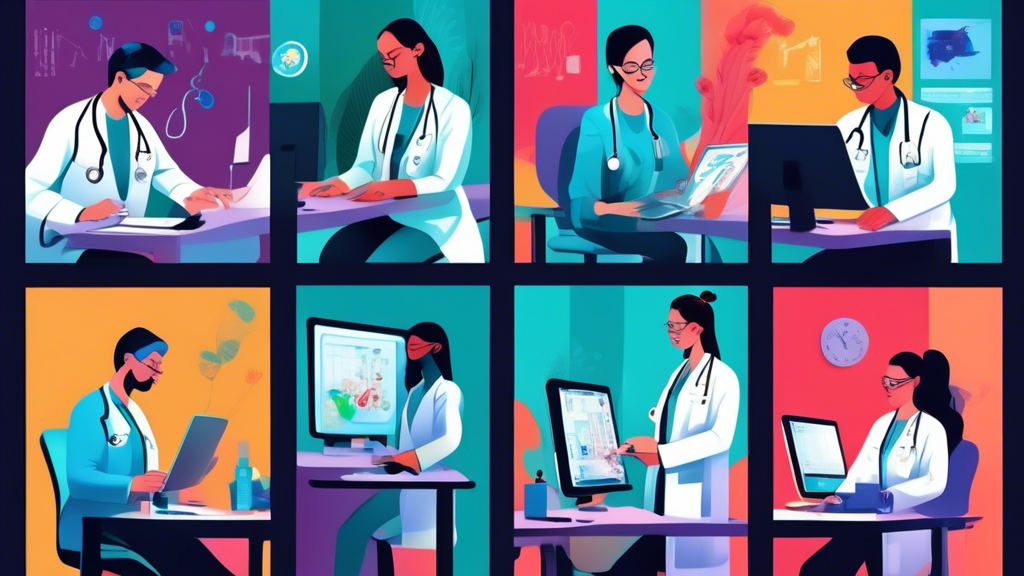The emergence of scribes, especially through medical scribe remote solutions, is reshaping how healthcare professionals handle patient interactions and record keeping. With the evolving healthcare landscape putting pressure on doctors and medical staff, virtual scribes have stepped in to provide support, easing the burden on healthcare providers. This transition streamlines processes and enhances the standard of patient care.
Understanding the Role of Medical scribe remote
scribes play a vital role in streamlining documentation during patient visits. They assist by taking real-time notes, documenting patient histories, updating health records (EHR), and ensuring that all essential information is accurately recorded without disrupting physician-patient consultations. This allows healthcare providers to concentrate fully on their patients, fostering an attentive care approach.
Advantages of Employing Medical scribe remote
Improved Efficiency: By utilizing virtual scribe services, healthcare institutions can significantly reduce time consumption. Physicians can manage their time efficiently, enabling them to attend to patients while maintaining high-quality care standards. This boost in efficiency often leads to increased productivity within the healthcare team.
Enhanced Patient Experience: Virtual assistants enable doctors to engage deeply with patients. By removing the note-taking burden, physicians can focus on building connections, resulting in communication and satisfaction. Patients feel listened to and respected, which is vital for healthcare delivery.
Cost Efficiency: Opting for assistants can lower operational expenses than hiring on-site staff. This is especially advantageous for healthcare facilities or practices with budgets. With the option, assistance practices can save on costs associated with office space, equipment, and benefits typically provided to full-time employees.
Flexibility and Scalability: Virtual medical assistants offer the flexibility to adjust staffing levels based on practice demands. For instance, clinics can increase scribe support during periods. Reduce it during slower times. This adaptability allows healthcare organizations to respond quickly to changing needs without compromising the quality of care.
Enhanced Documentation Accuracy: Utilizing assistants often results in precise documentation. Trained assistants excel at capturing details and nuances during consultations, reducing the risk of errors that may arise when healthcare providers juggle tasks simultaneously.
Improved record precision is crucial for delivering top-notch healthcare and adhering to legal and regulatory norms.
The Technology Driving Medical scribe remote
Advancements in telecommunication technologies have significantly shaped the rise of scribes. State-of-the-art video and audio conferencing tools enable scribes to participate in appointments. Additionally, secure cloud-based EHR systems facilitate real-time collaboration between the scribe and the healthcare provider, ensuring patient information is promptly updated and safeguarded.
Furthermore, advanced software applications tailored for documentation have enhanced the efficiency of scribing. Functions like voice recognition and phrase templates streamline the process, allowing scribes to create detailed patient notes swiftly. With advancements, medical scribe remote is expected to deliver even better results, fostering more vital collaboration between healthcare providers and their support staff.
Challenges in Implementation
Despite medical scribes’ advantages, implementing this service has its share of challenges. Security and privacy issues remain concerns, especially when handling patient data. Healthcare organizations must guarantee that all virtual scribes adhere to regulations such as HIPAA (Health Insurance Portability and Accountability Act), as data breaches can lead to repercussions.
In addition, getting scribes up to speed can take quite some time. Healthcare professionals must build trust with their scribes and adjust their communication to ensure that all detailed patient information is recorded accurately. Training programs and a structured onboarding process are crucial in overcoming these hurdles and smoothly integrating scribes into the healthcare workflow.
The Future of Medical scribe remote
The role of medical scribes is set for expansion. With healthcare seeking ways to enhance efficiency and patient engagement, the reliance on scribes may become even more widespread. Future advancements could involve training and specialization within the field, enabling scribes to handle more intricate medical scenarios and procedures.
Moreover, as telehealth services gain popularity, there will likely be a growing need for scribes. Remote patient consultations are becoming more common, leading to a demand for support systems that can manage documentation requirements effectively. By incorporating scribes into telehealth platforms, healthcare providers can ensure documentation regardless of how care is delivered.
Closing Thoughts
To wrap up, introducing scribes represents a significant change in the healthcare landscape, underscoring the value of support roles in improving care delivery and operational efficiency. As Nathaniel Barz suggests, the increasing demands on healthcare providers highlight the importance of implementing solutions to balance patient care and administrative tasks effectively. Embracing this approach not only helps ease the challenges faced by healthcare professionals but also has the potential to enhance patient experiences significantly. Through integration and ongoing enhancements, medical scribe remote is poised to play a crucial role in shaping the future of healthcare. Therefore, healthcare organizations must explore adopting this solution and capitalize on its advantages. By doing so, they can boost efficiency, cut costs, and ultimately elevate the standard of patient care. With their influence, the future looks promising for scribes, and the healthcare sector is set to expand in the years ahead.
